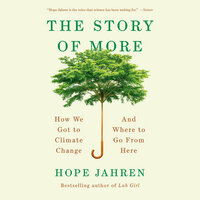Take a photo of a barcode or cover
467 reviews for:
The Story of More: How We Got to Climate Change and Where to Go from Here
Hope Jahren
467 reviews for:
The Story of More: How We Got to Climate Change and Where to Go from Here
Hope Jahren
informative
inspiring
reflective
fast-paced
A coherent and accessible explanation of the growth and development that has led to climate change. Jahren lays out the specifics of many contributing factors in 19 relatively short chapters, each focused on a particular topic (e.g., grain production, weather patterns). These straightforward explanations are presented with an undercurrent of sarcasm and accompanied with memoir and anecdotes; Jahren's memoir writing skills, already very good in [b:Lab Girl|25733983|Lab Girl|Hope Jahren|https://i.gr-assets.com/images/S/compressed.photo.goodreads.com/books/1441826687l/25733983._SX50_.jpg|45572105], are more streamlined and less overwritten -- and are more touching as a result. I appreciated her very wry sense of humor ("Hypocrisy and greed are not values Midwesterners tend to approve of," bless), as well as her practical approach to the issue at hand.
It's reassuring to read a book about climate change that acknowledges the problem and presents some actionable solutions, while also pointing out that fear mongering isn't a helpful way to induce change in others. Highly recommended for those looking for a lay understanding of technological development, its effects on the environment, and the data scientists have drawn on to report these changes.
It's reassuring to read a book about climate change that acknowledges the problem and presents some actionable solutions, while also pointing out that fear mongering isn't a helpful way to induce change in others. Highly recommended for those looking for a lay understanding of technological development, its effects on the environment, and the data scientists have drawn on to report these changes.
While I very much enjoyed the book, the prospect of convincing 3B people to want less as a way to stave off the worst impacts of climate change seems utterly hopeless. We can’t convince people to wear masks to avoid a pandemic.
This book is a sobering account of how we got to the point we’re at now this climate change. It definitely can be a bit depressing and make you feel that this planet is cashed, but it does leave some room for hope. You will feel worse about yourself after reading this, but I think that we’re probably supposed to.
FULL of details and facts on the contributing factors to global climate change. Unfortunately the author narrates the audiobook and she is SUCH a slow, monotonous speaker!! Even listening on double speed it was a difficult listen. I feel this would be more impactful read as a physical book. She has a lot of resources at the end of the book for people interested in learning even more and does provide useful suggestions on some ways we can focus on changing our habits in ways that will be the most effective (ie focus on a few things well instead of trying to change everything and not succeeding). Overall lots of information but maybe not the most accessible book on climate change I’ve read recently.
This was really good in the way that it gave small chunks of really good information about a ton of important subjects: growing population, meat and seafood industries, climate change, wealth disparities, etc. You almost feel paralyzed with all the problems she brings up, some obvious and others you hadn't even realized, but she even mentions herself at the end of the book, you can't do it all. You have to pick the causes most important to you and just do what you can.
This is a great selection for those who are interested in living more environmentally friendly especially if you lack a life science background. This felt extremely readable for any climate change novice. Even though I have spent years studying most of the content, I was still able to gain something from each chapter.
Slightly disappointing
I thought Hope Jahren’s “Lab Girl” was an amazing book. “The Story of More” does not quite measure up, although it is a far different book.
Focusing on climate change and global warming, Jahren goes through a list of all the things that humans do wrong now. The solutions are left to us, not to governments. Climate change is described as a problem coming from the haves not willing to share with the have nots. Somehow we need to share more. Just how to do that is left up to the reader and every solution seems impossible.
I thought Hope Jahren’s “Lab Girl” was an amazing book. “The Story of More” does not quite measure up, although it is a far different book.
Focusing on climate change and global warming, Jahren goes through a list of all the things that humans do wrong now. The solutions are left to us, not to governments. Climate change is described as a problem coming from the haves not willing to share with the have nots. Somehow we need to share more. Just how to do that is left up to the reader and every solution seems impossible.
Not only is Jahren's work well-researched, it is also beautifully written. She explains scientific principles in language that is easily understandable. Best of all, I appreciated that it wasn't simply a diatribe about climate change and how we've ruined the earth, but she also provided suggestions for steps that we, as individuals, can take to lessen our own impact.



